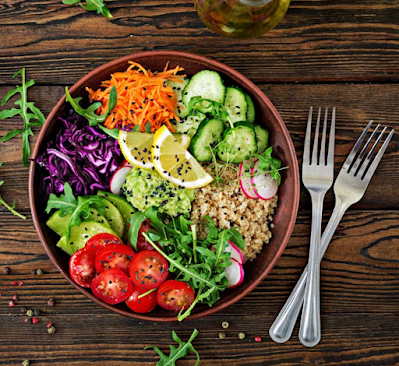Nutrition for Vegetarian Health
Why is Nutrition Important for Vegetarians?
Vegetarians need to make sure they are getting enough nutrients that are typically found in animal products. These nutrients include:
- Protein
- Iron
- Calcium
- Vitamin B12
Without these nutrients, vegetarians may become deficient and experience health problems. For example, a lack of iron can lead to anemia, while a lack of calcium can lead to weak bones.
Protein
Protein is an essential nutrient that is needed for growth and repair of the body's tissues. Vegetarians can get protein from plant-based sources such as:
- Beans
- Lentils
- Nuts
- Tofu
Iron
Iron is important for the production of red blood cells, which carry oxygen throughout the body. Vegetarians can get iron from plant-based sources such as:
- Spinach
- Kale
- Beans
- Tofu
Calcium
Calcium is important for strong bones and teeth. Vegetarians can get calcium from plant-based sources such as:
- Kale
- Broccoli
- Almonds
- Tofu
Vitamin B12
Vitamin B12 is important for the production of red blood cells and for the proper functioning of the nervous system. It is typically only found in animal products, so vegetarians may need to take a supplement or eat fortified foods to get enough of this vitamin.
Benefits of a Vegetarian Diet
There are many benefits to following a vegetarian diet, including:
- Lower risk of heart disease
- Lower risk of certain types of cancer
- Lower blood pressure
- Improved digestion
Disadvantages of a Vegetarian Diet
While there are many benefits to a vegetarian diet, there are also some disadvantages to consider. These include:
- Potential nutrient deficiencies
- Difficulty finding vegetarian options when eating out
- Social pressure to eat meat
FAQ
Q: Can vegetarians get enough protein?
A: Yes, vegetarians can get enough protein from plant-based sources such as beans, lentils, nuts, and tofu.
Q: Do vegetarians need to take supplements?
A: Vegetarians may need to take supplements, particularly for vitamin B12, which is typically only found in animal products.
Q: Can vegetarians eat dairy and eggs?
A: Some vegetarians do eat dairy and eggs, while others do not. It depends on the individual's personal beliefs and dietary choices.
Q: Is a vegetarian diet healthier than a meat-based diet?
A: It depends on the individual's dietary choices and the quality of the food they eat. A well-planned vegetarian diet can be just as healthy as a meat-based diet.
Conclusion
Being a vegetarian can be a healthy lifestyle choice, but it is important to pay attention to nutrition to ensure good health. Vegetarians need to make sure they are getting enough protein, iron, calcium, and vitamin B12 to avoid nutrient deficiencies. With proper planning, a vegetarian diet can be just as healthy as a meat-based diet.

